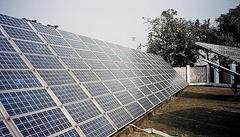

Environment
Indian solar predictions typify BRIC innovation
BRIC nations – Brazil, Russia, India and China – are fast becoming some of the most serious players in the global renewable energy market. Alex Blackburne explores the latest predictions for the Indian solar sector.
India could have as much as 33.4 gigawatts (GW) of solar power installed in the country by 2022 – a figure that dwarfs the governmental target of 20GW – according to an independent report.
BRIC nations – Brazil, Russia, India and China – are fast becoming some of the most serious players in the global renewable energy market. Alex Blackburne explores the latest predictions for the Indian solar sector.
India could have as much as 33.4 gigawatts (GW) of solar power installed in the country by 2022 – a figure that dwarfs the governmental target of 20GW – according to an independent report.
In its latest India Solar Handbook, strategic consulting company, Bridge to India, reveals the country’s solar industry is flourishing and that the initial state targets were neither ambitious nor accurate.
The report states that nearly half of the projected total will be realised by 2018, when grid parity will also be achieved.
It’s a massive opportunity. The Asian country has 1.2 billion inhabitants, nearly half of whom aren’t connected to the national grid.
“40% of [India’s] population does not have access to the grid”, Kadampat Punnan Philip, manager of the Indian Renewable Energy Development Agency (IREDA), said.
“But even the villages connected to the grid can benefit from solar power because the Indian grid is so unreliable.”
The reason for the projected surge is down to lower costs. Bridge to India’s study cites decreases within the sector of as much as 20% in the past two years – and it’s likely to continue falling.
The renewables industry of another member of BRIC, China, is, like India’s, flourishing. Although the country is now the world’s biggest carbon dioxide polluter, its presence on the clean technology scene is firm and undeniable, though it’s never short of a bit of controversy that attempts to nullify its progressive innovation.
China makes over £40 billion a year through cleantech and the industry is continuing to grow at an alarmingly positive rate. It increases by 77% every year in fact.
South Africa is evidently not a member of BRIC, but is in fact part of BRICS – a political engine consisting of the four BRIC nations and the newly-added South Africans, who had originally been deemed to be too small an economy to be part of the grouping.
Following 2011’s COP17 talks which were held in Durban, it was announced that it would join the other four to form a standalone group.
BRIC, a group which was first coined in 2001 by Goldman Sachs economist Jim O’Neill, in a paper entitled The World Needs Better Economic BRICs.
And it’s not the only one of its kind either. As well as BRICS, there is IBSA, BASICs, ASEAN (Association of Southeast Asian Nations), the Shanghai Cooperation, and of course, the G20.
The make-up of each group can be seen in the following diagram, as found in a 2010 Economist article.
 The five BRIC nations announced in December that they were to club together to develop alternative energy sources.
The five BRIC nations announced in December that they were to club together to develop alternative energy sources.
“Facing the prospects of running out of fossil energy and the related environmental issues, developing new energy is an inevitable choice“, Bu Xiaolin, vice governor of China’s Inner Mongolia region, told delegates at the first BRICS Friendship Cities and Local Governments Cooperation Forum in December.
“We are very willing to cooperate with BRICS countries on new energy innovations, promotion and market development.”
The collaboration between the five countries is potentially ground-breaking. Think about it: five climbing economies joining forces to innovate renewable technologies.
It’s the perfect scenario for them and the planet.
For a country with such a venerably traditional past, India’s emergence as a serious renewable energy player is both heartening and exciting.
Continued investment in renewable energy in the UK will propel it amongst the frontrunners within the sector. You can help to do this. Ask your financial adviser about investing in renewable technology. Or let us find you a specialist ethical one by filling in our online form. Either way, your money can make a massive difference.
Picture source: Hiroo Yamagata


 Environment12 months ago
Environment12 months agoAre Polymer Banknotes: an Eco-Friendly Trend or a Groundswell?

 Features11 months ago
Features11 months agoEco-Friendly Cryptocurrencies: Sustainable Investment Choices

 Features12 months ago
Features12 months agoEco-Friendly Crypto Traders Must Find the Right Exchange

 Energy11 months ago
Energy11 months agoThe Growing Role of Solar Panels in Ireland’s Energy Future




























